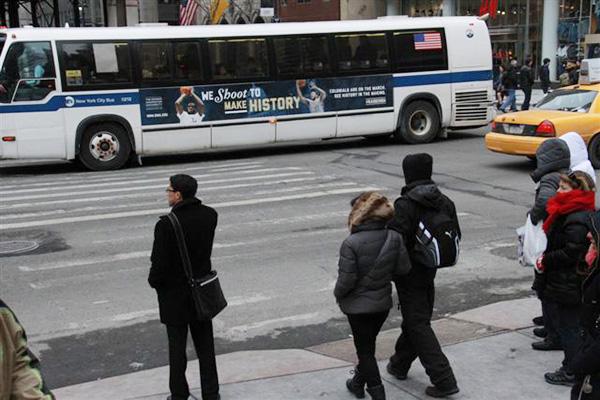As Patrick Nero planned for the men’s basketball team trip to New York City for the Atlantic 10 Tournament, he wanted to energize the 17,000 alumni that live there.
But the director of athletics and recreation couldn’t pay to plaster about 100 buses with GW-centric designs in Manhattan and Brooklyn through April until he convinced the admissions and fundraising offices to lay down money as well.
The move brought three office’s different goals together for one campaign. The admissions office would excite potential high school seniors from one of its top feeder areas and the fundraising team would mobilize big pockets of alumni before its largest-ever campaign goes public. Plus, it would generate interest for the basketball team.
“We just felt like things were coming together at the right time,” Nero said. “New York is always going to be a focus for GW.”
So far, GW basketball games have been in high demand in the New York area.
GW penned a deal this year with a local New York cable network to air 15 of the basketball games on television. Nero said GW sold out every ticket they had for every game in New York this season.
Nero said his main goal for the athletics department was “to continue to build on the support that started a year ago.”
“We’ve been so appreciative that we want to be able to continue to grow that,” Nero said. “For admissions, it’s reminding those students at this particular time of that GW-New York City connection. For development, it really is engaging alumni ahead of the campaign.”
Nero declined to comment on the total cost of the marketing push, but said with the combined budgets of his department, admissions, fundraising and external relations, that “it doesn’t impact any of our budgets negatively.”
“It’s a question of resources. None of us had the resources to do it on our own,” Vice President for External Relations Lorraine Voles, who oversees GW’s marketing, added. “When we started looking into it, it made sense.”

Voles said she wanted to take advantage of attention surrounding the A-10 Tournament, similar to how the University timed its large advertising campaign around President Barack Obama’s Inauguration last year.
The University bought walls of advertising space in Union Station, highlighting academic programs and drawing attention away from the slew of bad press after it had been unranked by the college ranking publication U.S. News & World Report. That campaign cost $700,000.
“It’s like taking advantage of an opportunity. It’s the same type of thing last year: We did it in D.C. to take advantage of the Inaugural. This was a very similar thing on a much smaller scale,” Voles said.
She added that she wanted GW “to have a presence and generate some excitement. And it did that,” citing several alumni tweeting about the buses.
Mike Morsberger, GW’s fundraising chief, added that the New York region “plays an important role in GW’s reach outside of D.C.”
In addition to the department’s annual entertainment and networking events, he pointed to the 700 alumni who packed the Waldorf Astoria last fall to hear University President Steven Knapp and philanthropist Michael Milken speak about public health.
Before the A-10 tournament quarter- and semifinal games, the University hosted pre-grame receptions with buffets and open bars, maxing out the capacity at the Barclays Center with about 800 attendees, he said.
The marketing effort underpins how Nero’s office is focusing on fan and donor outreach to build up funding for an athletic department that had struggled to compete with conference competition.
With 2,000 students and alumni at the Barclays Center last weekend for the Atlantic 10 tournament, momentum is building within GW’s fanbase.
Now that the team has energized alumni to turn out for New York City games, the athletics department is trying to build a larger base of season ticket holders, adding revenue and tying fans closer to the program.
Garrett Klassy, senior associate athletics director, said the department will focus on tens of thousands of recent graduates in the D.C. area. He said the department will be more aggressive calling fans to renew ticket packages.
“We want them to bring a lot of energy to the building. And as they progress in their careers, we want them to come back and buy full season tickets,” Klassy said. “Sporting events have a tendency in this country to bring people together. It’s a great way for development and alumni relations to reach out to their supporters.”







